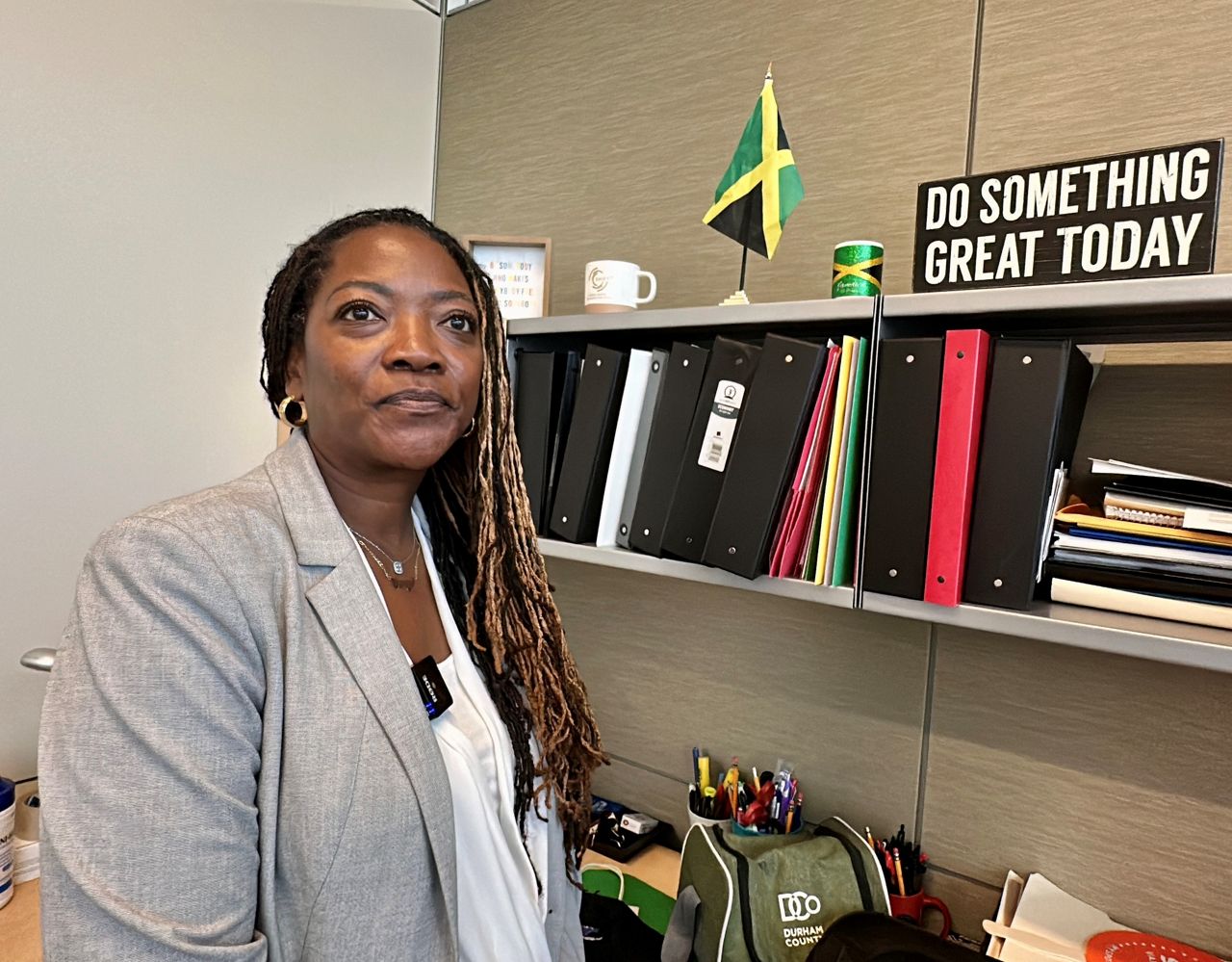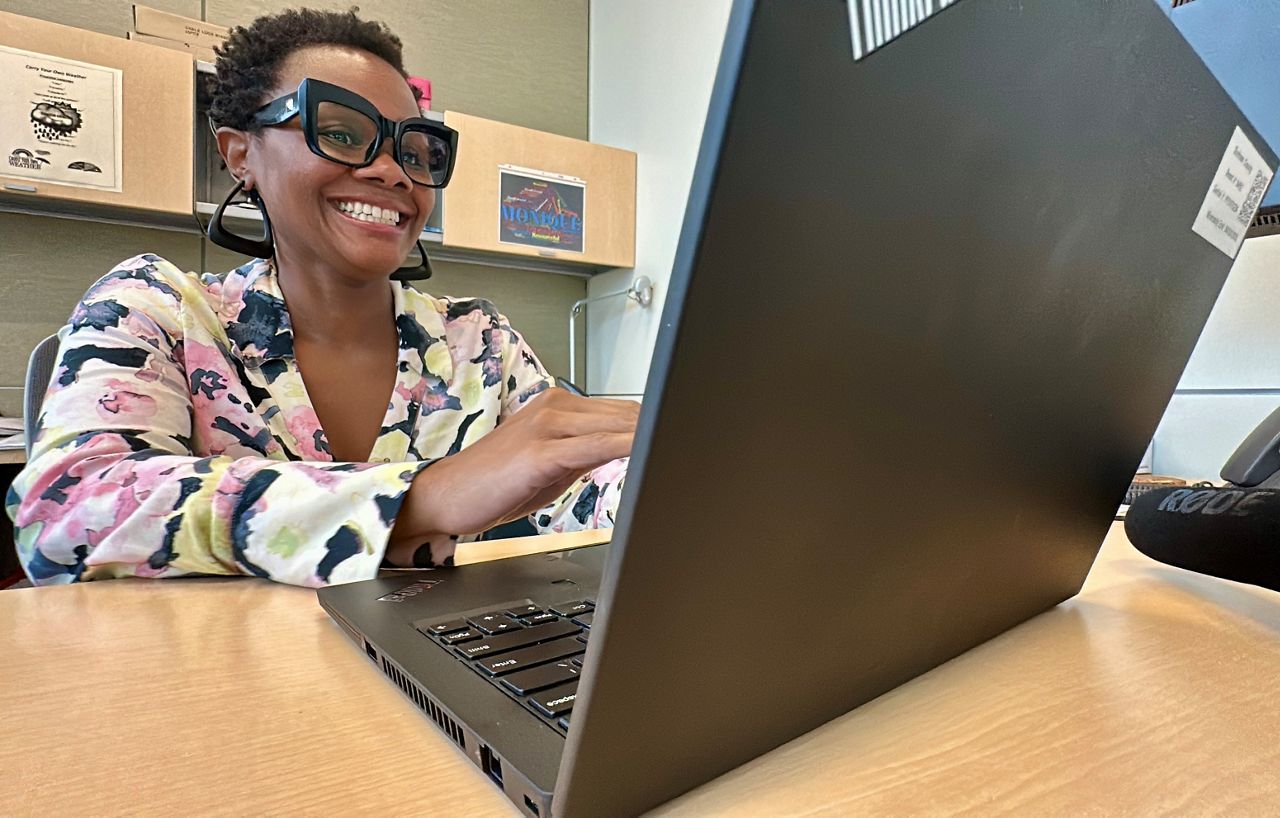DURHAM, N.C. — Children come into this world, grow up and develop their personalities as they cultivate dreams, but the playing field isn’t level.
One recent high school graduate has navigated the uncertainty of life with grace, going from foster care child to adopted daughter.
“I am actually the first one to go into college,” Brielle Jno-Baptiste said. Brielle, who goes by Bri, entered the foster care system at the age of 10. She and her two siblings were legally separated from their biological mother. Crystal Jno-Baptiste welcomed them into her life with open arms.
“It was a huge change, and it just makes me see that people can be anything with the right love and the right situation,” Crystal Jno-Baptiste said. “They were my kind. I loved them.”
The trio started fresh the day they moved into Crystal Jno-Baptiste's Durham home. She became their foster mom on Dec. 31, 2015, Bri Jno-Baptiste said.
“She told us that — I will never forget this — what the devil meant for bad, God will turn it to good. And I will never forget that because that is the first thing that she came and told us,” Bri Jno-Baptiste said.
The first-generation college enrollee overcame the odds on the path to achieving her dreams. “My mom, she's the reason that I've made it this far,” Bri Jno-Baptiste said.
She said she thought about this as she walked across the stage at Cameron Indoor Stadium to receive her Jordan High School diploma. It was at that moment a goal became a reality.
“Where I come from, I would have never guessed it,” Bri Jno-Baptiste said.
But earning a high school degree was never guaranteed.
The Congressional Coalition on Adoption Institute reports 70% of all youth in foster care desire to go to college, yet nearly 25% of youth aging out of the system don’t have a high school diploma or GED. Only 6% go on to graduate from a four-year institution.
Before Bri Jno-Baptiste learned to succeed in life and in the classroom, she said she had to first deal with years of pain, trauma and abuse. “I had a really hard time. It took me many years to heal,” she said.

The Durham County Department of Social Services plays a major role, as well. Tanza Moye is the special services supervisor of the department.
“Encouraging them and letting them know they are as normal as any other child that has not been in foster care,” Moye said.
She understands the difficulty of facing new settings. Moye immigrated to America from Jamaica.
“Regardless of your background, regardless of your circumstances, you can achieve great things,” she said.
Moye has served in this role for eight years, and with the agency almost 18 years. Moye also supervises the LINKS independent living program for youth who have been in care ages 14-21. “We support them regularly by meeting, talking about what the goals look like and how we can help them to get to where they want to,” Moye said.
Moye said Bri Jno-Baptiste has brought lived experience to the initiative.
“She's on our youth leadership council, so she gets a lot of support from us as well. She brings good ideas. She could be a mentor. She could be an advocate for other young people in her situation. She brings ideas and suggestions,” Moye said.
Bri Jno-Baptiste and other foster children will plan, orchestrate and coordinate the LINKS meetings. “That's the awesome young lady,” Moye said.
“Because she's so resilient, she would still end up in a good situation. But the fact that she has such a caring mom who stepped up, the world is like her oyster at this point. She can achieve anything because she's had that support,” Moye said.

The steps to becoming a foster parent take time as well. Monique Smith is the DCDSS Foster Home licensing supervisor. “The first thing we try to get them to realize and train them on is that they need to maintain their connections to their birth families,” Smith said.
Bri Jno-Baptiste’s communication with her siblings has waned since the three were split apart for a time. Although they entered a foster home together, she said they are no longer living in the same home.
While maintaining connections is key for anyone considering opening their home to children, Smith said the protocol to be approved to provide foster care is extensive.
“You can tell when someone's doing it basically for the money,” Smith said.
The vetting process for foster parents is thorough, requiring background checks and home visitations before placement becomes official.
“The foster parents are just not out there unsupervised. Someone is in their home every month, and licensing workers are in there every quarter, at least every quarter,” Smith said.
Licensing workers are assigned to presumptive foster parents as soon as they enter preservice. Preservice is a mandatory, 30-plus-hour training class over 10 weeks that an adult has to take to become a foster parent.
Preservice isn’t only learning how to become licensed. This is when potential parents learn of what a youth experiences, how children enter their care and how to accept youth into their home while teaching these potential foster parents on what they can expect.
“I always tell them to think about it as your first day on your job. Like, what would you want to know?” Smith said.
It’s why foster parents are encouraged to set realistic expectations before a child enters their home.
“No. 1, I have always been a very empathetic and compassionate person. I can see the same life I see for myself for anyone else,” Smith said. “I am just in the neighborhood of helping people and helping others."
Being a mother to a young daughter shapes Smith’s approach to her work. “And it makes me really care about the people that we are asking to become foster parents because anything could happen, right?” Smith said.
Smith pointed out how Bri Jno-Baptiste's life has been shaped for the good because of proper placement with Crystal Jno-Baptiste.
“Just stability. Just like putting them somewhere that they are going to stay, which is a huge plus. When you're fostering a child, they have to have stability,” Crystal Jno-Baptiste said.
Crystal Jno-Baptiste said she has been an entrepreneur, investor and an owner of a tire company for 20 years. The 61-year-old is now retired.
As far as how Bri Jno-Baptiste got Crystal’s last name, the answer is simple.
Crystal Jno-Baptiste made Bri Jno-Baptiste her daughter for good through adoption in July 2022. “I am very proud to call her my daughter,” Crystal Jno-Baptiste said.
And Bri Jno-Baptiste is happy to call Crystal her mom.
“Ever since, we've been inseparable,” Bri Jno-Baptiste said. “No matter if we were having a hard time, she was always there.”
Bri Jno-Baptiste will attend N.C. State University in the fall.
Durham Social Services is looking for prospective parents willing to take children who are 10 and older. If you would like to be a resource parent, call the agency at (919) 560-8092 or email fosterdreams@dconc.gov to learn more.



